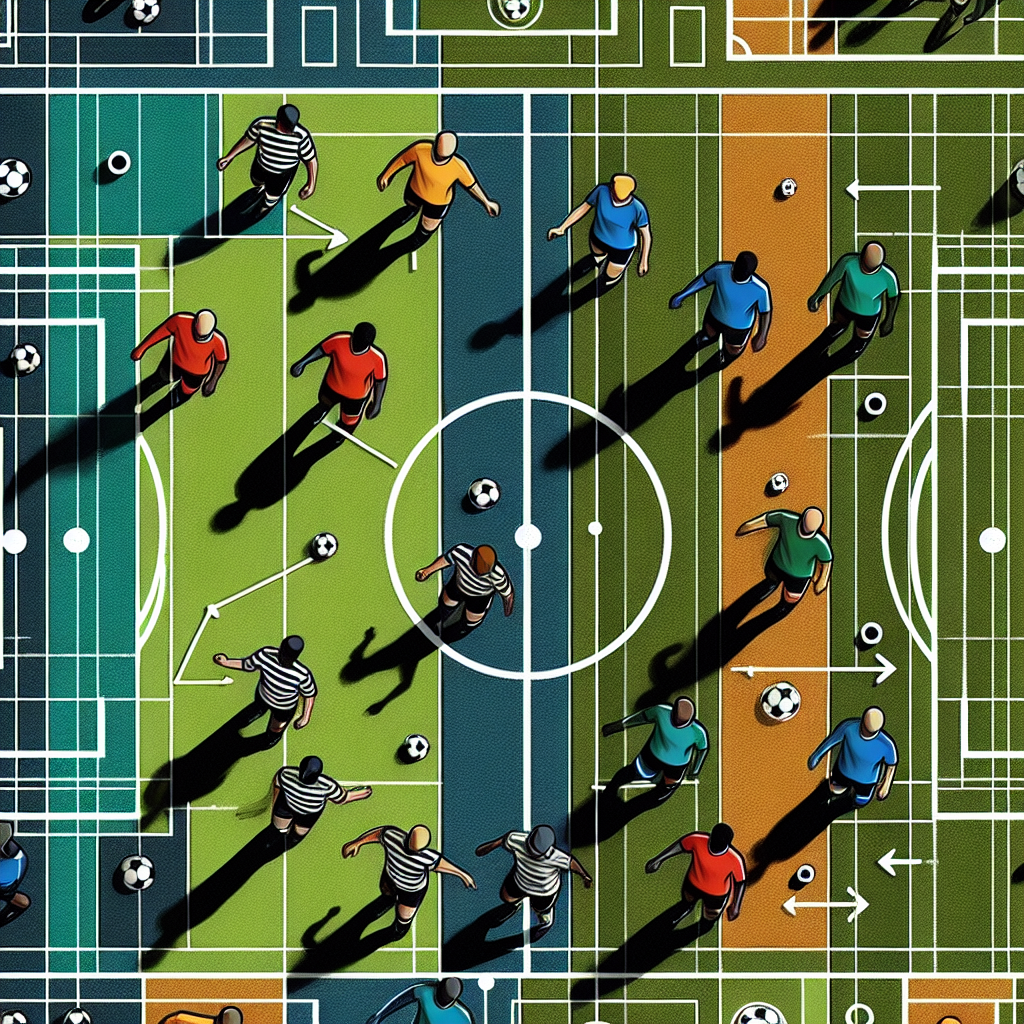
Introduction
Comeback soccer scores have become one of the most thrilling aspects of the game, captivating fans across the globe. The psychology behind these remarkable recoveries reveals a complex interplay of mindsets, emotional states, and team dynamics. Whether it’s a last-minute goal or a dramatic turnaround in the second half, understanding the psychological factors that contribute to these unforgettable moments can enhance our appreciation of the sport. In this article, we will delve deep into the psychology behind comeback soccer scores, exploring the motivations, pressures, and mental fortitudes that drive teams to defy the odds in 2025.
The Intriguing Nature of Comeback Soccer Scores
The phenomenon of a comeback in soccer is not just about sheer luck or individual talent; it often involves a profound psychological shift among players and teams. A deficit can create a sense of despair, but conversely, it can also ignite a fire within a team. This dynamic showcases a key psychological principle—the power of belief. When a team finds itself down in score, the players must grapple with feelings of hopelessness and discouragement. However, this situation can also foster a resilient mindset where the desire to overcome becomes greater than the fear of failure. In essence, the psychology of comebacks revolves around the transformation of negative emotions into a vigorous drive for victory.
Moreover, the role of fan support in soccer cannot be underestimated. When a team is trailing, the energy and encouragement from supporters can significantly influence the players’ morale. The phenomenon of ‘home advantage’ is partly rooted in psychological factors—players often draw strength from their fans, leading to increased motivation and performance levels. Conversely, for the leading team, the pressure can be overwhelming. The fear of losing a lead and disappointing fans can weigh heavily, often leading to errors that allow the opposing team to stage a comeback. This interplay of emotions fuels the drama and excitement of comeback soccer scores, making them even more irresistible to fans.
Mindset Shifts During High-Pressure Moments
During high-stakes matches, a range of emotions floods through players, provided they possess the psychological agility to harness these feelings positively. When a team finds itself trailing, the transition from a hopeless mindset to an empowering one becomes paramount. Coaches play a critical role in instilling mental resilience; tactical adjustments can often be overshadowed by motivation and psychological support. Successful coaches encourage players to visualize their comeback, framing the challenge as an opportunity rather than an insurmountable obstacle. This mental reframing, characterized by a growth mindset, fosters resilience, enhancing the players’ ability to cope with setbacks.
In 2025, advanced psychological training techniques have become more prevalent among professional teams. Incorporating sports psychologists into training sessions helps players understand their emotions, reducing anxiety and promoting self-confidence. Visualization and mindfulness practices enable players to remain focused and present, even in moments of crisis. By embracing these strategies, teams cultivate a culture of resilience, allowing them to maintain belief in their potential for comeback scores. This psychological strength transcends the field, influencing not only individual performance but also team cohesion.
The Role of Team Dynamics and Cohesion
Team dynamics play a pivotal role in the psychology behind comeback soccer scores. Successful comebacks are often the result of collective effort rather than isolated brilliance. When a team falls behind, strong cohesion becomes critical. Players must trust one another, displaying unity in their strategies and execution. The psychological principle of social identity suggests that when individuals identify strongly with their team, they’re more likely to push their limits during challenging moments. This shared identity fosters a sense of responsibility toward one another, ultimately enhancing performance.
Furthermore, effective communication is essential in fostering that team dynamic. In moments of adversity, clear communication allows players to express their needs, strategize effectively, and recalibrate their approach. Coaches increasingly advocate for an environment where players can freely communicate their emotions, helping to maintain morale. This transparency can mitigate the pressure felt by individuals, anchoring the team’s collective focus on the goal ahead. As teams continue to prioritize mental and emotional well-being in 2025, we see how the psychological fabric of camaraderie leads to incredible moments of resilience on the pitch.
The interconnectedness of player roles within a team also influences the psychology of comeback situations. Each player must recognize their contributions and roles during a challenging game, motivating each other to strive for improvement. A player may understand they can make a difference not only through their performance but also through encouraging teammates. This sense of agency fosters an atmosphere where players feel empowered to take risks that may ultimately lead to a comeback score, showcasing the profound psychological implications of teamwork in soccer.
Handling Pressure and Managing Expectations
Handling pressure is one of the most intricate elements that contribute to comeback soccer scores. As the clock winds down and the team finds itself in a challenging position, the weight of expectations can be paralyzing. Players are acutely aware of what’s at stake—winning or losing can influence their careers, reputations, and financial success. This high level of pressure can lead to heightened stress and anxiety, inhibiting performance. However, the psychological concept of ‘pressure privilege,’ where high-pressure situations are viewed as opportunities for growth, can be harnessed by players to enhance their performance.
Coaches in 2025 are increasingly adopting psychological strategies that focus on building resilience during high-pressure scenarios. Incorporating stress-management techniques, such as breathing exercises and positive affirmations, helps players navigate their emotions more effectively. This preparation creates a mental toolkit that athletes can draw upon as they face adversities within a match. Players who view pressure as a motivator rather than a hindrance often excel and amplify their team’s chances of achieving a comeback score.
Aside from the players, managing expectations from the coaching staff, media, and fans plays a crucial role during come-from-behind scenarios. In this digital age, where instant reactions flood social media, external pressures can exacerbate feelings of anxiety. Coaches now emphasize the importance of focusing on the game itself rather than external expectations. They create focused environments where the team’s motto revolves around perpetual improvement, helping players stay grounded amidst the cacophony of outside noise. This mindful approach cultivates an atmosphere conducive to effective strategy implementation, increasing the probability of successful comebacks.
The Significance of Experience and Historical Context
Experience plays a pivotal role in the psychology behind comeback soccer scores. Veteran players often possess a wealth of knowledge about how to navigate high-pressure situations, thus influencing the younger members of the team. Their past experiences shape their understanding of what it takes to mount a comeback, allowing them to impart invaluable lessons on mental fortitude to their teammates. These seasoned players are familiar with the ebbs and flows of a match, which helps them recognize the importance of maintaining focus, adapting quickly, and making crucial decisions under pressure.
In 2025, teams increasingly reference historical matches to motivate and prepare players for potential comebacks. Learning from past famous comebacks serves as a reminder of possibilities; teams can draw inspiration from historical events that exemplify resilience. For instance, matches like Liverpool’s miraculous 2005 Champions League final serve as motivational case studies. Understanding these contexts fosters a belief within a team that anything is possible, thereby reinforcing their mental resolve during challenging times.
Moreover, the integration of data analytics in soccer has transformed how teams prepare for matches. Analyzing historical data enables teams to identify the psychological patterns that lead to successful comebacks. By examining previous performances, teams can design tailored strategies to counter opponents, bolstering their chances of reversing a deficit. This data-driven approach promotes informed decision-making and encourages players to embody a mindset that embraces the importance of perseverance in achieving comeback soccer scores.
Conclusion
The psychology behind comeback soccer scores is a multifaceted subject that encompasses belief, teamwork, pressure management, and the value of experience. As the world of soccer continues to evolve in 2025, it becomes increasingly evident that the mental aspect of the game is as critical as physical skill. Teams that harness the power of psychological training and cultivate a resilient mindset increase their chances of staging remarkable comebacks.
Understanding these dynamics not only deepens our appreciation for the sport but also highlights the resilience, motivation, and courage displayed by athletes in the face of adversity. As fans, witnessing a comeback can be one of the most exhilarating experiences, rooted in the profound psychological forces at play within the game.
FAQs
What psychological factors contribute to a team’s ability to stage a comeback in soccer?
Psychological factors such as belief in potential, team cohesion, effective communication, and the ability to handle pressure all contribute to a team’s capacity to orchestrate a comeback in soccer.
How does fan support influence a team’s performance during a challenging match?
Fan support boosts player morale and fosters motivation. When teams feel the energy and encouragement from fans, it can elevate their performance, particularly when they are trailing.
Why are experienced players vital in creating successful comebacks?
Experienced players possess knowledge of high-pressure situations and can lead by example. Their insights and calming presence can guide younger teammates, enhancing overall team resilience during comebacks.
What role does coaching play in facilitating comeback performances?
Coaching is essential in instilling mental resilience and implementing psychological strategies. Good coaches empower players, offer emotional support, and foster an environment focused on improvement.
How can teams prepare psychologically for the pressures of a high-stakes match?
Teams can prepare by integrating stress management techniques, fostering open communication, and creating a culture of continuous improvement focused on resilience and belief in their abilities.
Understanding Team Offensive Efficiency Ratings
16. Dezember 2025The Role of Advanced Stats in Evaluating Team Chemistry
16. Dezember 2025How to Interpret Team Defensive Metrics
16. Dezember 2025
Leave a reply Antwort abbrechen
-
Team F Dominates: The Road to Championship Victory
14. Dezember 2025 -
The Rise of Populism in Europe: Lessons for American Politics
8. Dezember 2025



